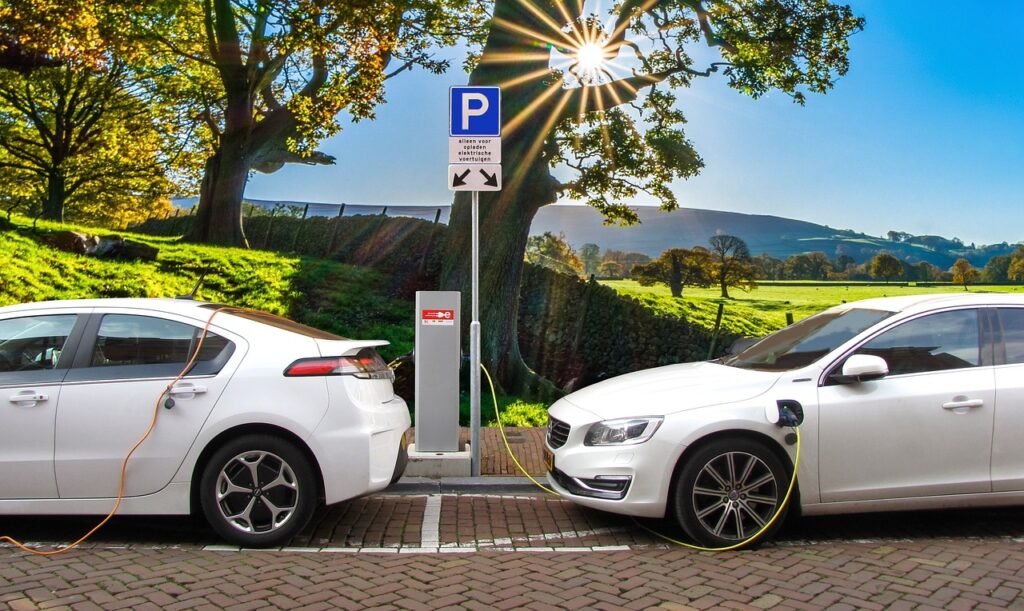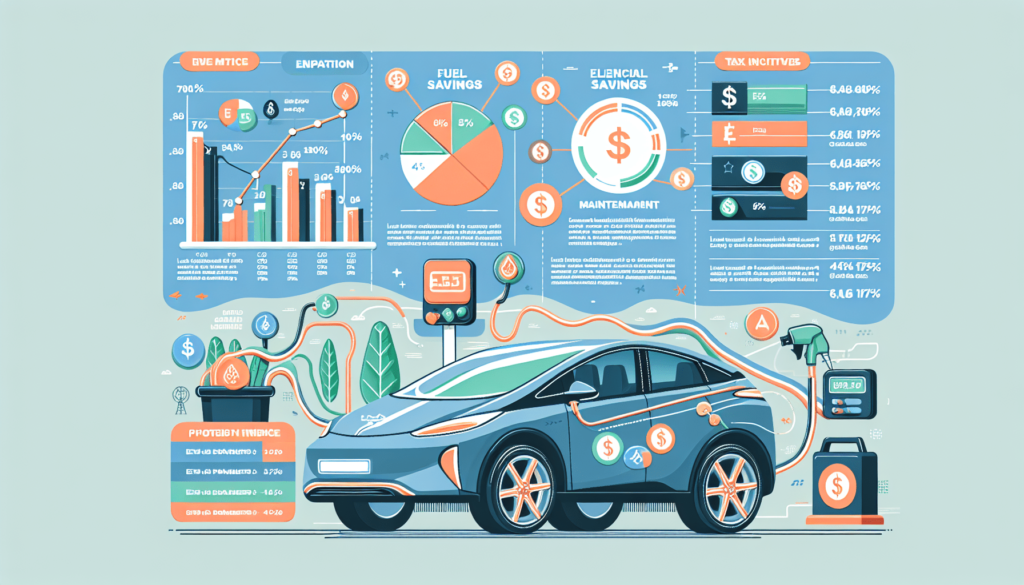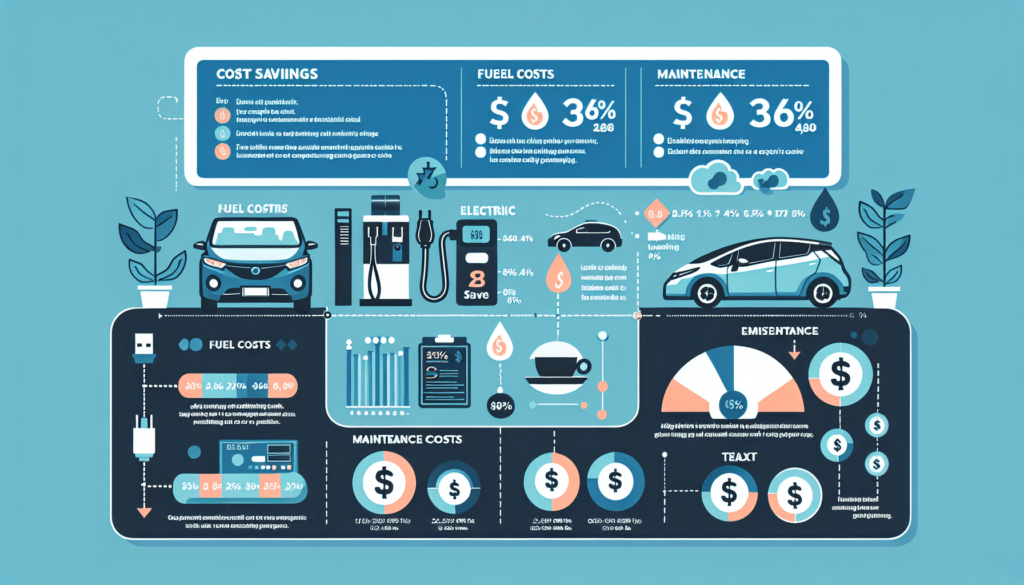If you’ve ever wondered about the potential savings that come with owning and operating an electric vehicle, you’re in luck. This article explores the various ways in which owning an electric vehicle can save you money in the long run. From reduced fuel costs to lower maintenance expenses, owning an electric vehicle presents a myriad of financial advantages. So, if you’re considering making the switch to an electric vehicle, keep reading to discover how it can help you save both your wallet and the environment.

This image is property of pixabay.com.
Lower fuel costs
Electricity vs. gasoline/diesel
When it comes to fuel costs, electric vehicles (EVs) have a significant advantage over traditional gasoline or diesel-powered vehicles. Instead of relying on expensive and fluctuating oil prices, EVs use electricity, which is generally much cheaper and more stable. With an EV, you can save a substantial amount of money on fuel expenses, especially when compared to the ever-increasing costs of gasoline and diesel.
Lower electricity prices
Not only do EVs offer a cost-effective alternative to gasoline or diesel, but the prices of electricity are often lower as well. Many utility companies offer discounted rates for off-peak charging, allowing you to take advantage of cheaper electricity during specific times of the day or night. Additionally, with the growing adoption of renewable energy sources, the cost of electricity is expected to decrease further, making EVs an even more affordable option for daily transportation.
Reduced dependence on fluctuating oil prices
One of the benefits of owning an EV is the reduced reliance on fluctuating oil prices. As the price of oil can vary significantly due to factors such as geopolitical tensions or natural disasters, EV owners are shielded from these fluctuations. By opting for an electric vehicle, you can have peace of mind knowing that your fuel costs will remain relatively stable, regardless of external circumstances.
Lower maintenance and repair costs
Fewer moving parts
When compared to internal combustion engines, electric motors have considerably fewer moving parts. This simplicity of design translates to lower maintenance and repair costs for EV owners. With fewer components prone to wear and tear, you’ll have fewer things to worry about, reducing both the frequency and the expenses associated with maintenance and repairs.
No oil changes
One of the ongoing costs that traditional vehicles necessitate is regular oil changes. However, with an EV, you can bid farewell to this task altogether. Electric motors do not require oil for lubrication, eliminating the need for frequent oil changes. Not only does this save you money, but it also reduces the environmental impact of oil extraction and disposal.
Less frequent brake replacement
Electric vehicles rely on regenerative braking, a technology that converts the vehicle’s kinetic energy into electrical energy and stores it in the battery. This means that EVs use the brakes less frequently compared to conventional vehicles, resulting in reduced wear on brake pads and rotors, and ultimately leading to longer-lasting brakes. As a result, you’ll save money on brake replacements over the course of your EV ownership.
Longer lasting brake pads
Thanks to regenerative braking, electric vehicles put less strain on their brake pads. The regenerative braking system helps slow down the vehicle while simultaneously recharging the battery, meaning that traditional friction braking is used less frequently. This extended lifespan of brake pads can result in significant savings over time, as you won’t have to replace them as often as you would with a conventional vehicle.
Reduced likelihood of engine/transmission repairs
Since EVs don’t have internal combustion engines or conventional transmissions, the likelihood of encountering expensive repairs related to these components is greatly reduced. Without the complexities and potential failures of engine and transmission systems, you can enjoy peace of mind knowing that maintenance costs associated with these areas are significantly minimized.
Simplified maintenance requirements
In addition to fewer moving parts and no need for oil changes, electric vehicles generally have simplified maintenance requirements compared to their gasoline or diesel counterparts. EVs eliminate the need for scheduled maintenance tasks such as spark plug replacements, air filter changes, and fuel system cleanings. As a result, you’ll spend less time and money on routine maintenance, allowing you to enjoy a hassle-free driving experience.
Government incentives and tax credits
Federal tax credits
Governments around the world are recognizing the importance of transitioning to electric vehicles and are offering various incentives to encourage their adoption. In many countries, including the United States, federal tax credits are available to offset the upfront cost of purchasing an electric vehicle. These tax credits can provide a significant financial advantage, making EVs more accessible and affordable for potential buyers.
State-level incentives and rebates
In addition to federal incentives, many states also offer their own incentives and rebates for EV owners. These programs can include cash rebates, sales tax exemptions, reduced registration fees, and more. The specific incentives vary from state to state, so it’s important to research the options available in your area. Taking advantage of these incentives not only helps lower the initial cost of an EV but also contributes to long-term cost savings.
Local incentives
Besides federal and state-level incentives, local governments, such as cities and municipalities, may offer additional benefits to EV owners. These incentives can include free or discounted parking, access to carpool lanes, and reduced or waived toll fees. These perks not only make driving an EV more affordable but also provide added convenience and advantages for owners.
HOV lane access and toll discounts
One of the benefits that EV owners enjoy is access to High Occupancy Vehicle (HOV) lanes, even with only one occupant in the vehicle. This can significantly reduce commuting times and provide a more efficient and convenient driving experience. Additionally, some regions offer toll discounts or exemptions for electric vehicles, allowing you to save money on road travel expenses.
Lower insurance costs
Cheaper insurance premiums
Insuring an electric vehicle can often be cheaper than insuring a traditional gasoline or diesel vehicle. Several factors contribute to this cost-saving advantage. EVs are typically equipped with advanced safety features and tend to have lower accident rates. Furthermore, the reduced risk of fire or explosion associated with EVs also plays a role in lowering insurance premiums. By opting for an electric vehicle, you can potentially save a considerable amount of money on insurance costs.
Potential for specialized EV insurance
With the rise in popularity of electric vehicles, insurance companies are recognizing the need for specialized coverage tailored to the unique needs of EV owners. These specialized policies can offer enhanced protection for EV-specific components, such as the battery, electric motor, and charging equipment. By opting for specialized EV insurance, you can have peace of mind knowing that you have adequate coverage specific to your electric vehicle.
Availability of discounts for EV owners
In addition to potentially lower insurance premiums and specialized coverage, many insurance companies offer discounts for electric vehicle owners. These discounts can vary from company to company but often focus on the environmental benefits associated with driving an electric vehicle. By taking advantage of these discounts, you can further reduce your insurance costs and maximize your overall savings as an EV owner.

This image is property of pixabay.com.
Decreased depreciation
Slower rate of depreciation
One advantage of electric vehicles is their slower rate of depreciation compared to traditional vehicles. While all vehicles experience depreciation over time, EVs tend to retain their value better due to factors such as improving technology, increased consumer demand, and government incentives. This slower depreciation rate can offer significant long-term cost savings when it comes to ownership and resale value.
Higher resale value
Due to the slower rate of depreciation, electric vehicles generally have higher resale values compared to their gasoline or diesel counterparts. This means that if you decide to sell or trade in your EV in the future, you’re likely to get a better return on your initial investment. Higher resale values contribute to your overall savings as an EV owner, making them an attractive financial option.
Premium for used electric vehicles
While higher resale values are advantageous for EV owners looking to sell their vehicles, it’s worth noting that the demand for used electric vehicles often leads to a premium being placed on them. This means that if you’re considering purchasing a used EV, you may have to pay a slightly higher price compared to a similar traditional vehicle. However, the increased upfront cost can often be offset by the long-term savings associated with owning an electric vehicle.
Reduced environmental costs
Lower carbon emissions
One of the most significant advantages of electric vehicles is their lower carbon emissions compared to gasoline or diesel vehicles. By switching to an electric vehicle, you can significantly reduce your carbon footprint and contribute to a cleaner and more sustainable future. With the ever-increasing concern for climate change and air pollution, driving an electric vehicle allows you to make a positive impact on the environment and protect the planet for future generations.
Health benefits from improved air quality
In addition to reducing carbon emissions, electric vehicles also contribute to improved air quality, benefiting both the environment and human health. Traditional vehicles emit pollutants such as nitrogen oxides (NOx) and particulate matter, which contribute to respiratory issues and other health problems. By transitioning to electric vehicles, we can reduce air pollution, leading to cleaner and healthier communities.
Reduced noise pollution
Another often overlooked benefit of electric vehicles is the reduction in noise pollution. Unlike traditional vehicles that produce engine noise, EVs operate quietly thanks to their electric motors. This means that electric vehicles contribute to quieter neighborhoods, less traffic noise, and a more peaceful driving experience. By choosing an electric vehicle, you can enjoy the serenity of a noise-free ride, benefiting not only yourself but also those around you.

This image is property of pixabay.com.
Lower operating costs
Regenerative braking
Electric vehicles incorporate regenerative braking technology, which allows them to recover energy that is typically lost during braking. Instead of converting the vehicle’s kinetic energy into heat (as in traditional vehicles), regenerative braking converts it into electrical energy, which is then stored in the battery for later use. This process not only increases the overall efficiency of EVs but also reduces wear on the braking system, resulting in lower maintenance costs.
Efficient electric motors
Electric motors used in electric vehicles are significantly more efficient than internal combustion engines. This efficiency leads to lower energy consumption, allowing electric vehicles to travel further on a single charge compared to the equivalent amount of fossil fuel. As electricity costs are generally lower than the cost of gasoline or diesel, you’ll experience lower overall operating costs as an EV owner.
Reduced need for heating and cooling systems
Electric vehicles often benefit from more efficient heating and cooling systems compared to traditional vehicles. EVs can use heat pumps for climate control, which are more energy-efficient than the conventional heating and cooling methods used in internal combustion engine vehicles. These advanced systems help reduce energy consumption, resulting in lower operating costs throughout the year.
Lower electricity consumption compared to fossil fuels
While the cost of electricity varies depending on your location and utility provider, it is generally cheaper than gasoline or diesel on a per-mile basis. Electric vehicles tend to be more energy-efficient, meaning they consume less energy for the same distance traveled. Additionally, as the cost of electricity continues to decrease with the adoption of renewable energy sources, the savings associated with electric vehicle operation will likely become even more pronounced in the future.
Lower overall costs of ownership
Total cost of ownership (TCO) advantage
When considering the overall costs associated with owning and operating a vehicle, electric vehicles often offer a significant advantage over their gasoline or diesel counterparts. This advantage is commonly referred to as the Total Cost of Ownership (TCO). The TCO of an electric vehicle takes into account factors such as purchase price, fuel costs, maintenance costs, and depreciation over the vehicle’s lifespan. Electric vehicles consistently come out on top, providing long-term cost savings for owners.
Long-term cost savings
By taking into account the various cost-saving factors discussed in this article, it’s evident that electric vehicles offer substantial long-term cost savings. Lower fuel costs, decreased maintenance and repair expenses, reduced insurance premiums, and improved depreciation rates all contribute to the overall financial advantage of owning an EV. While the upfront cost of electric vehicles may still be higher in some cases, these long-term savings make them an attractive and economically viable option for many people.
Calculating the payback period
Calculating the payback period, or the time it takes for an electric vehicle’s savings to compensate for any higher upfront costs compared to a traditional vehicle, is an essential consideration for potential EV owners. While individual circumstances and driving habits will influence the payback period, with the numerous cost-saving benefits of electric vehicles, this timeline is continually decreasing. As technology advances, prices decrease, and incentives increase, the payback period for owning an electric vehicle continues to become shorter, making it a financially sound choice for many individuals.

Access to charging infrastructure
Utilizing home charging stations
One of the key benefits of owning an electric vehicle is the convenience of home charging stations. By installing a Level 2 charging station at your residence, you can easily and efficiently recharge your vehicle overnight or whenever it’s not in use. Home charging stations provide the flexibility and ease of having a “refueling” station right at your doorstep, eliminating the need for frequent visits to public charging stations.
Public charging stations
Public charging infrastructure plays a vital role in supporting the widespread adoption of electric vehicles. Across the globe, charging stations are becoming more prevalent, making it increasingly convenient for EV owners to charge their vehicles while away from home. Public charging stations can be found in various locations such as shopping centers, parking garages, and rest areas, allowing you to recharge your vehicle during your daily activities or longer trips.
Fast-charging networks
Fast-charging networks offer an additional layer of convenience for EV owners, allowing for rapid charging on-the-go. These networks typically consist of high-powered chargers that can recharge an electric vehicle’s battery up to 80% or more within a short timeframe, sometimes as little as 20-30 minutes. Fast-charging networks are particularly beneficial for long-distance travel or when you need to quickly top up your battery while running errands.
Workplace charging programs
Many employers recognize the benefits of electric vehicles and are incentivizing their adoption through workplace charging programs. By providing dedicated charging stations at businesses and office complexes, employers enable their employees to conveniently charge their vehicles while at work. This perk further enhances the practicality and affordability of electric vehicles, allowing owners to save money on fuel costs during their daily commutes.
Potential for self-sufficiency
Generating and storing renewable energy
As renewable energy sources become more accessible and affordable, EV owners have the potential to become more self-sufficient in terms of energy generation. By installing solar panels or other renewable energy systems at your home, you can generate clean and renewable energy to power both your household and your electric vehicle. This self-sufficiency provides greater control over energy costs and further reduces dependence on external sources.
Energy independence
By relying on electricity rather than gasoline or diesel, electric vehicle owners can achieve a level of energy independence that is not possible with traditional vehicles. With a robust charging infrastructure, renewable energy generation, and energy storage solutions, EV owners can reduce reliance on external energy sources. This sense of energy independence aligns with the growing desire for sustainability, resilience, and self-sufficiency in our daily lives.
In conclusion, owning and operating an electric vehicle can lead to significant cost savings in various aspects of ownership. Lower fuel costs, reduced maintenance and repair expenses, government incentives and tax credits, lower insurance costs, decreased depreciation, reduced environmental costs, lower operating costs, access to charging infrastructure, and the potential for self-sufficiency all contribute to the overall affordability of electric vehicles. With advancements in technology and increasing adoption rates, the cost savings associated with electric vehicles are set to continue growing, making them an attractive and financially viable option for individuals looking to save money while driving a cleaner and more sustainable alternative.


